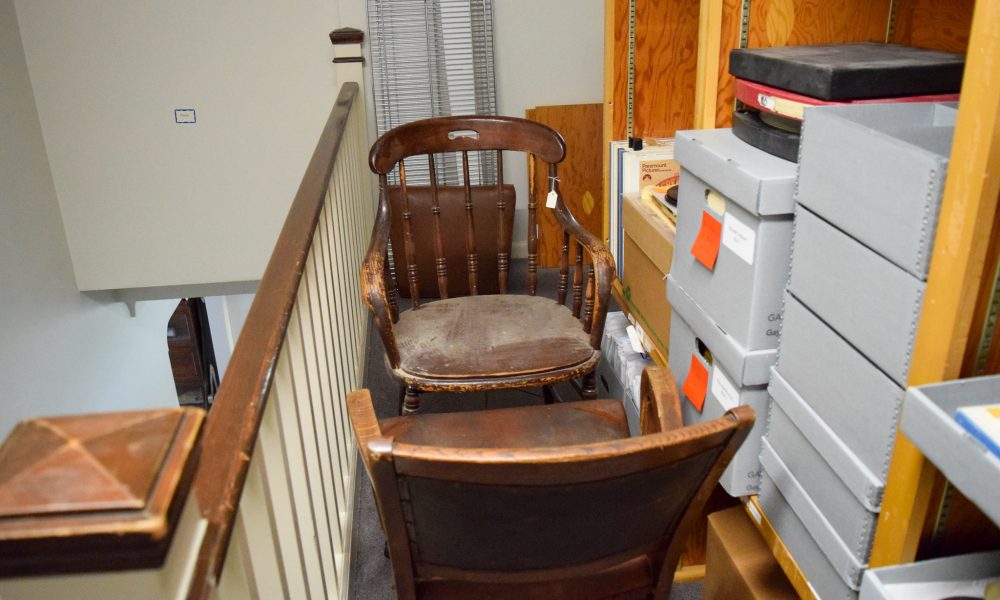
Old chairs will soon be housed in the Oregon State Hospital Museum of Mental Health’s basement. (Saphara Harrell/ Salem Reporter)
Inside the nearly century-old cottage, two dusty chairs wait at the top of the staircase.
The armrests are weathered, strips of light brown are revealed under the dark stain. A numbered tag hangs from the armrest.
Soon these chairs, remnants of a different time at the Oregon State Hospital, will have a new resting place thanks to a $6,113 grant from the Oregon Heritage Commission.
The Oregon State Hospital’s Museum of Mental Health, located on the facility’s grounds, applied for the grant to rehouse hundreds of pieces of furniture that are not on display in the museum.
[ KEEP YOUR LOCAL NEWS STRONG – SUBSCRIBE ]
The museum opened in 2012 to tell the stories of the people who lived and worked at the hospital. One of its main attractions are the exhibits that tell the story of “One Flew Over the Cuckoo’s Nest,” which was filmed on site. Inside the museum, a bench featured in the film is on display.
Before the museum opened, there was a lot of furniture in the former administrative building’s basement.
“If you think about the hospital as kind of functioning as its own entity for a considerable amount of time, there’s a lot of stuff that people would use much like a regular home,” Curator Megan Lallier-Barron said.
Currently, many of the sewing machines, desks and chairs sit in the old cottage, but soon they will be moved to the museum basement.
Kathryn Dysart, president of the museum board, said the cottage space is “typically not in ideal conditions for the preservation of these artifacts,” which is part of the reason the museum sought the grant.
“The grant that we got from the heritage commission is in part to re-house that furniture in the most conservation-appropriate way,” Dysart said.
There are set guidelines for how to maintain such objects, Lallier-Barron said, and the museum is working with a conservator to help plan the best way to store the historic items.
That could include putting Tyvek covers on some of the furniture to block the light that can be damaging to historic relics.
Dysart said half the money would go toward buying steel storage racks and commercially-made plastic pallets to store heavy furniture, like desks and organs.
“We need to be able to move them without having four strong men come and pick them up,” she said.
In addition to moving the collection to the museum’s basement, Dysart said staff will tidy their database on each item. Museum goers may notice new numbers on items, without any context, that helps track those details in a database.
By adding that information, she said it makes the research for future exhibits and programs much tidier.
“When we first inventoried the collection, we noted that there were more than 4,000 articles in the collection. But at that time you could have a cardboard box that had a layer of photographs, hypodermic syringes and a straightjacket. And that box was counted as one thing,” Dysart said.
She said what’s fascinating about the museum collection is the enormity of the institution – which at its height housed more than 3,000 patients – caring for individuals with their own unique stories.
Dysart said the objects in the collection reflect that duality.

An old sewing machine is one of the items that will be rehoused in the Oregon State Hospital Museum of Mental Health’s basement. (Saphara Harrell/Salem Reporter)
The museum also has an eye toward the future.
“One of the hardest things we work on now, is what do we save that’s currently used that will be fascinating to people 50 to 100 years from now,” Dysart said.
The hospital recently replaced its locking mechanisms after they were determined to be a ligature risk and the museum collected sample pieces of the hardware for its collection, according to Lallier-Barron.
“How we try to approach things at the museum is that every object has a story,” Lallier-Barron said. “We want to be able to do that so we can tell those stories farther down the road.”

An old sewing machine is one of the items that will be rehoused in the Oregon State Hospital Museum of Mental Health’s basement. (Saphara Harrell/Salem Reporter)
Have an event coming up? Contact reporter Saphara Harrell at 503-549-6250, [email protected] or @daisysaphara.









